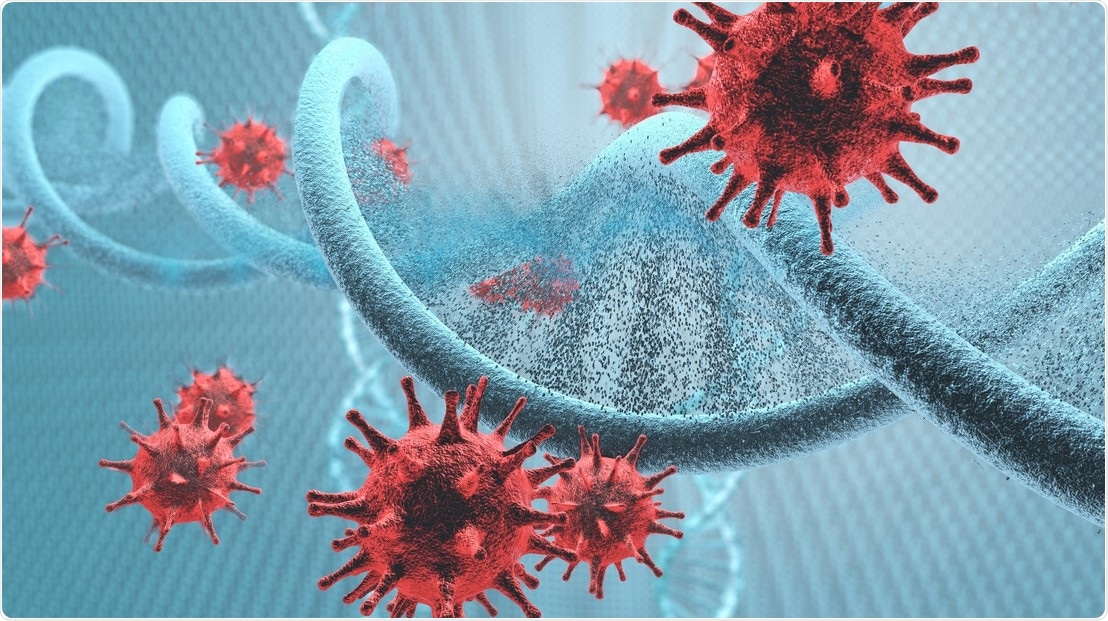Viruses usually inject their DNA into a host cell to multiply. As soon as this foreign material penetrates the intracellular fluid, it activates a defense mechanism called the cGAS-STING pathway.

Image Credit: iStock photos.
The fluid also contains cyclic GMP-AMP Synthase (cGAS), a type of protein that produces a new molecule by binding to the invading DNA. This subsequently attaches to another protein, known as Stimulator of Interferon Genes (STING), which promotes an inflammatory immune reaction.
At times, the material held within the fluid—and in close contact with the cGAS protein—arises from the cell itself and not from a virus, for example, following the accidental rupture of the nucleus. When this process occurs, the cGAS-STING pathway is not triggered.
Now, EPFL researchers have shown how cells are capable of responding differently to a genetic material from a pathogen and to their own DNA—and prevent attacking the incorrect target. Published in the Science journal, the study offers a better understanding of the intricate processes involved in the inflammatory response of the body.
The research team, headed by Professor Andrea Ablasser and in association with collaborators from the laboratories of Professor Beat Fierz and Professor Selman Sakar, sheds new light on the crucial role of a tiny protein called Barrier-to-Autointegration Factor (BAF).
The team demonstrated that when the BAF attaches to the inoffensive DNA, it inhibits the cGAS protein from doing the same and thus halts the cGAS-STING pathway in its tracks.
The cell nucleus is strengthened by the BAF, which also links the nuclear envelope, or membrane, to the DNA within. Experiments have demonstrated that the elimination of this protein from laboratory-grown cells causes the nucleus to rupture.
This breach discharges the genetic material into the intracellular fluid, where it makes contact with the cGAS protein and activates the cGAS-STING pathway—just as if it were a foreign DNA.
Nucleus can be ruptured by numerous ways, for example, by applying mechanical pressure. However, according to one of the study’s lead author Baptiste Guey, only one of these techniques—except the BAF protein—triggers an immune response.
We can therefore conclude that BAF plays a key role in preventing the cell from attacking its own DNA.”
Baptiste Guey, Study Lead Author, EPFL
The inhibitor role of the protein is particularly crucial: while the cGAS-STING pathway supports the body in fighting against infections, it must also be kept in check.
Nuclei do occasionally rupture, but cells are able to repair the damage. If cGAS bound to the DNA every time that happened, the consequences would be more serious.”
Marilena Wischnewski, Study Lead Author, EPFL
The risk of an overactive cGAS-STING pathway can be observed in Aicardi-Goutières syndrome—a rare but fatal genetic disease that triggers an excess inflammatory reaction as if the cells of the body have undergone a continuous attack from the invading microorganisms.
BAF is also considered to play a major role in certain types of tumors. According to Wischnewski, a high protein concentration in cancer cells may be linked to a poorer prognosis.
It could be that BAF makes tumors more resistant. By preventing activation of the cGAS-STING pathway, it might allow cancer cells to evade the body’s immune system.”
Marilena Wischnewski, Study Lead Author, EPFL
The protein is present in different amounts in different kinds of cells. The researchers are now planning to look deeper into these changes as they seek to interpret how different types of tissues react to inflammation and infection.
Source:
Journal reference:
Guey, B., et al. (2020) BAF restricts cGAS on nuclear DNA to prevent innate immune activation. Science. doi.org/10.1126/science.aaw6421.